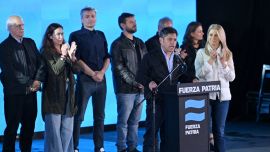He has vowed to "put Argentina back on its feet," after more than two years of recession, high inflation and growth in unemployment and poverty figures – but Peronist leader Alberto Fernández has yet to produce details on how he plans to achieve these lofty goals.
The 60-year-old lawyer has united the many strains of Peronism, a movement which has previously marked by years of historic divisions. He did so on account of his moderate and pragmatic approach to politicking – as well as the useful addition of former president Cristina Fernández de Kirchner to his ticket.
Without a party of his own and after years outside of active political life, the president-elect's biggest challenge will be running and handling his coalition government, according to political analyst Enrique Zuleta Puceiro.
"Fernández is a very experimental person. He masters international relations and the debt. He's very prepared. He's a man of the government, but he's not a man of the State. His biggest challenge will be to administer this heterogeneous coalition," Zuleta Puceiro said.
The search for equilibrium in maintaining unity of this alliance has come to fruition with the creation of a Cabinet that now represents almost all of the coalition's leanings.
"I wanted the unity to be reflected in the government," Fernández said when he presented the full line-up on Friday.
Problems and advantages
The first problem Fernández will have to face is the renegotiation of Argentina's debt, both external debt held with private bondholders and that owed to the International Monetary Fund (IMF).
For this task, he has chosen Martín Guzmán as his economic minister, who considers it "imperative" that payments for both capital and interest are restructured/
"We're working with the IMF. It's work that should take place quietly, but the people of Argentina should remain calm and assured that we're working to resolve it, and that we're satisfied with how it's evolving," said Fernández.
Héctor Rubini, a professor from the University of Salvador, highlights that though there hasn't been a clear announcement of economic strategy, it's "clear" through his selection of economic advisors that incoming president will prioritise the "intervention of the State to promote industrialisation" and, consequently, the "recuperation of employment and growth of demand."
For the first few weeks of the government, Rubini predicts this will include strict currency control and the approval of a budget law that reassigns funds to combat poverty.
The inheritance
Macri leaves Fernández with a very challenging economic landscape —a 3.1 percent economic downturn for the year, 44 percent inflation up until October, a 40 percent poverty rate, 10.4 percent unemployment and a near 40 percent depreciation in the value of the peso.
"I don't leave satisfied with how much the economy grew during my mandate or with the results of the fight against inflation and poverty," Macri said during his final televised speech last week.
However, Macri did lower the fiscal deficit and increase the international currency reserves.
Having promised a constructive opposition during the next four years, Macri continues to sustain that "our democracy is stronger, our judiciary is more independent, and our press is more free," than it was when he took office.
– TIMES/AFP



















Comments